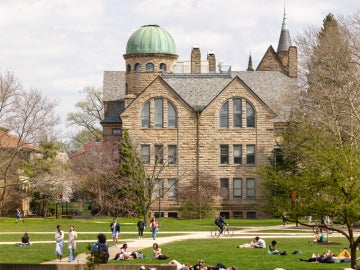Where'd We Park? Researching Memory and Aging
January 20, 2016
Amanda Nagy

Student collaborators working in Jan Thornton’s neuroscience lab. From left, Nate Bohm-Levine, Jackson Fried, Hannah Rodgers, and Emilia Varrone.
Photo credit: Yvette Chen
“You don’t know where we parked? This is great,” fumes George Costanza in one of the most popular episodes of Seinfeld.
“I didn’t pay attention. I’m sure it’s right around here,” Elaine says. “Yeah, it looks familiar,” Kramer reassures. I remember the elevator.”
George: “There’s elevators all over! Everything looks the same! We’re like rats in some experiment!”
When Professor Jan Thornton delivered a president’s lecture on aging and memory to a full house in Dye Lecture Hall last fall, she introduced the topic of spatial memory with the example of wandering aimlessly in a shopping center parking lot, a scene that’s quite familiar to Seinfeld fans, or at least retail-weary consumers of a certain age.
Forgetting where you parked can be panic-inducing, but science has an explanation for this spatial memory lapse. Thornton, the Claire M. McGregor Professor of Neuroscience, studies the effects of hormones on the brain and sex-specific differences. Her research in the last several years has focused on the role of hormones in Alzheimer’s disease and, more broadly, aging.
With her student collaborators, she is one of the few researchers studying the basic science of the effects of luteinizing hormone (LH) in humans. This is important because they have found that high levels of LH appear to be harmful to the hippocampus, which is an important brain structure for memory. She recently wrote a review for the journal Hormones and Behavior, co-authored by Veronica Burnham ’14, on the way LH impacts cognitive decline in Alzheimer’s disease.
Most of her work has focused on females. That’s because estrogen, a hormone that declines in menopause, has a profound effect on memory. As women produce less estrogen, their memory is impaired. But something else happens: LH levels increase, putting a double hit on the hippocampus. Women also get Alzheimer’s earlier and more often than men, which may be related to menopause and declining estrogen.
Thornton says the same inverse relationship is true for androgen hormones and LH in males, but the decline in androgens happens later for men. “For someone with susceptibility to Alzheimer’s, the hippocampus becomes more fragile which leads to more memory problems.”
These findings come from experiments modeled with rats. Human memories are much more complicated than those in rats, but the principles are the same. In both, the hippocampus region plays an important role in memory formation.
A promising treatment could come in the form of an LH inhibitor. Her lab’s earlier research found that LH blocked spatial memory, even in estrogen-treated female rats, and an LH inhibitor enhanced spatial memory. Up until now, however, a direct LH receptor blocker was unavailable. Instead, Thornton’s lab used a drug that is used to treat endometriosis in women. “It’s a different endpoint, but the same effect,” she says. “We used it purposefully because it’s used safely on humans.”
More recently, Thornton has used an actual LH receptor blocker that she obtained from another scientist. This targets LH directly at the hippocampus, rather than blocking LH elsewhere. The results show that an LH blocker directly at the hippocampus enhances spatial memory in rats.
Thornton notes, “We don’t see this as a cure for Alzheimer’s, but quite frankly, we have very poor treatment options anyway. Anything we can develop to fill our arsenal with weapons against the cognitive decline of Alzheimer’s seems beneficial.”
Her lab is currently conducting research to understand the mechanism of LH. Fourth-year Nathaniel Bohm-Levine is working on a project that investigates how LH specifically targets the brain to affect cognition. He’s looking at the potential role of brain-derived neurotrophic factor, a molecule involved in cell health and cell growth.
A neuroscience major and chemistry minor from Los Angeles, Bohm-Levine has applied for a variety of one- and two-year fellowships after graduation with the intention of doing research abroad, and he plans to apply for combined MD/PhD programs.
“Doing research is one of the best ways to learn and grow for anyone interested in the sciences,” he says. “At Oberlin, faculty members really encourage you to work independently and think critically, which for me has had a lot of impact on both my personal growth and preparing me to do good research at other institutions through summer programs.”
Thornton says science students benefit from the faculty’s commitment to teaching. “Because we are educators, a lot of the research we do is teaching. Sometimes the large research universities are really only interested in the output, so students aren’t necessarily being taught how to do it; they’re more or less cogs in the machines. At Oberlin, instead of being one student out of 100 or 1,000 that gets that experience, it’s going to be the majority of them.”
You may also like…
Oberlin Launches Critical AI Studies Minor in Fall 2026
With a solid foundation in both science and the humanities, this minor ensures students to understand and be able to analyze the ethical, cultural, environmental, political, economic, technological, and labor effects of AI.
Research Roundup
Every day, Oberlin’s faculty and students produce scholarly work that uncovers new insights into how we understand the world, particularly in the areas of sustainability and the environment.
Three Things with Jillian Scudder
Oberlin’s astrophysicist-author shines a light on our dark universe.


